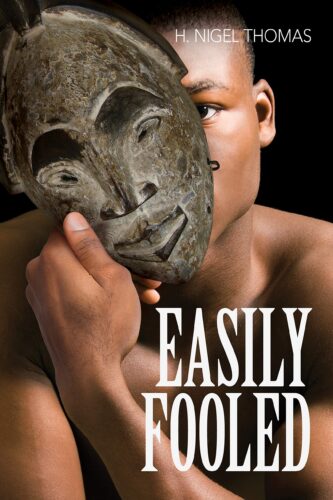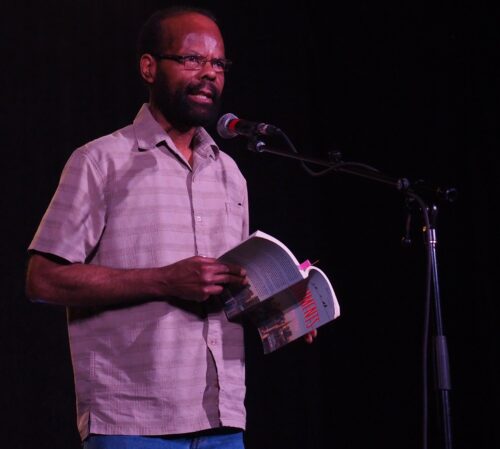Easily Fooled, by H. Nigel Thomas
Guernica Editions, 2021, 293 pages
It does not matter how sharp and on top of things we are, we have been duped and hoodwinked too easily at some point in our lives – be it by siblings, by neighbours, by family, by lovers, by priests, by religions or by ideologies.
Whatever grabs us as extraordinarily sensuous, comforting and reliable is a toss away from possible disappointment and ultimate disillusionment. Easily Fooled is about this, and about the source of our being fooled: the double-talk in all branches of theology.
This novel is also about the savage cruelty dispensed towards homosexual love. Its exposure enables Thomas to condemn the sepulchres, mausoleums and walls of holy books erected by religions – to wield the wrath of God and commandeer social norms and social acceptability.
In the first twelve pages of Easily Fooled, we are introduced to a dozen and a half characters who play a significant role in the novel, not to mention St. Paul (often referred to as Paul) – the chronic fabricator of twisted tales, in my opinion. It is quite a swarm that the reader has to deal with, and it might be wise to take notes so as not to miss out on the meticulous writing, set-up and editing informing this novel.
Having said that, the reason why there is a “swarm” is that Nigel Thomas needs his readership to understand that he is originally from the island of St. Vincent, where right now there is an active volcano… But if there were no ashes and rocks showering down on villages and towns, there would be folks pouring onto the streets and speaking up from balconies and playing Rasta on porches – jiving, hollering, badgering and teasing people, lying and spreading unwarranted rumours.
It is a fairly boisterous atmosphere we are drawn into at the outset – and it comes in welcome sharp contrast to that trend of moody psycho-sexual novels about two or three lonesome people in downtown high-rises or sitting on rock cliffs in lonely coastal fishing towns. I mean, it’s okay to ponder over just-released criminal pedophile uncles in isolated towns, but there is a world outside worth talking about as well, and that is what makes Thomas’ novel invigorating, intelligent and persistent about the original sin of religious doctrinairism.
Millington, a practicing and celibate Methodist preacher who is well-respected, honoured and a tortured soul, flees St. Vincent and his “celibate-osis” to settle in Montréal – an escape that is facilitated by his marriage to another St. Vincentian named Jay, who had a crush on him during their school days together and is now a Canadian citizen.
Doris, girl, I gotter be running. I know is delicious Bajan coo-coo you gi’ing the reverend today. I done smell it. Like you scheming to turn he into a real Bajan.
That is Horton – Millington’s one-time fling, a wicked palm-tickling, crotch-beholding, double-life-leading shadow man, patois-ing his way through life and now talking teasingly to Rev. Millington’s housekeeper, Doris, and suggesting that Millington never gets down! Meaning, he is too serious!
And yes, there are pederasts, too, in this novel, as there are in a lot of other Canadian novels! Thankfully there are no exotic exiles peddling incense furiously. And yet Nigel Thomas slices and dices in life in and around McGill University in Montréal and back into the streets and boroughs of St. Vincent and Barbados, through the eyes, voice and thoughts of Millington. Thomas has honed Millington as a trained parish priest, a very believable, polite, dignified intellectual who has had homosexual desires since his early childhood.
He has been parroting the Lord’s prayer and the Apostle’s Creed since he was four. Woe to the mother whose child couldn’t.
The chance encounter with that skin that seduces so smoothly, is so difficult to look away from – never mind touch – and may very well have been masked, is the deception that leaves Millington hiding behind a facade of inscrutability. The suffering itself from self-doubt makes him a refugee. Makes him travel away, after he defrocks himself intellectually. It is that skin, that bearer of the cross, that pain and suffering of hiding away, which Thomas conveys deftly, holding our hands as we navigate through this life.
Thomas uses a single incident with Horton as a long, curving, cantilevered bridge transporting us from St. Vincent all the way to Montréal, through the somewhat dubious arrival of Horton’s wife, Gladys, the bearer of his two kids. Her objective is purportedly to carry on her own theological studies. Thomas takes us back and forth between the two countries to document and portray the life of the tormented Millington, arriving in Montréal “penniless and dependent,” and gradually sharpening his convictions in his beliefs and the need for rationality in the human soul. Flat-earthers beware!
While Millington’s torment about his sexual preferences could be central to the novel, it is the deeper torment about the disingenuity and “original word” doctrinairism of his commitment to the Wesleyan Orthodox Methodism (AMC – the Authentic Methodist Church) that carries the book through.
There is an extraordinarily infectious array of characters that sweep through this novel. Halfway through it, the following description captures the essence of the story and the stylish literary cadence of its author. I will end this review with that segment about a group of religious discussants that Millington had joined while still in the Caribbean.
When Millington joined the group, they were five. Membership was by invitation only. Before Millington’s time, three members had left: Ezra, a rabbi he had met briefly—a short man with olive complexion, squarish build, and uncommonly black and thick eyebrows—had wanted meetings to be reflections on theology; Bennet—an ash-coloured Moravian, a palm-tree of a man (at least seven feet) with large teeth, an orange-sized Adam’s apple, and a booming bass voice that all envied—had left because Horace had called Christ’s resurrection story a primitive Middle-Eastern myth. Sacrilege for Moravians. Christ’s resurrection is the foundation of their theology.
An intense and well-written novel indeed, for the times we are living through!










